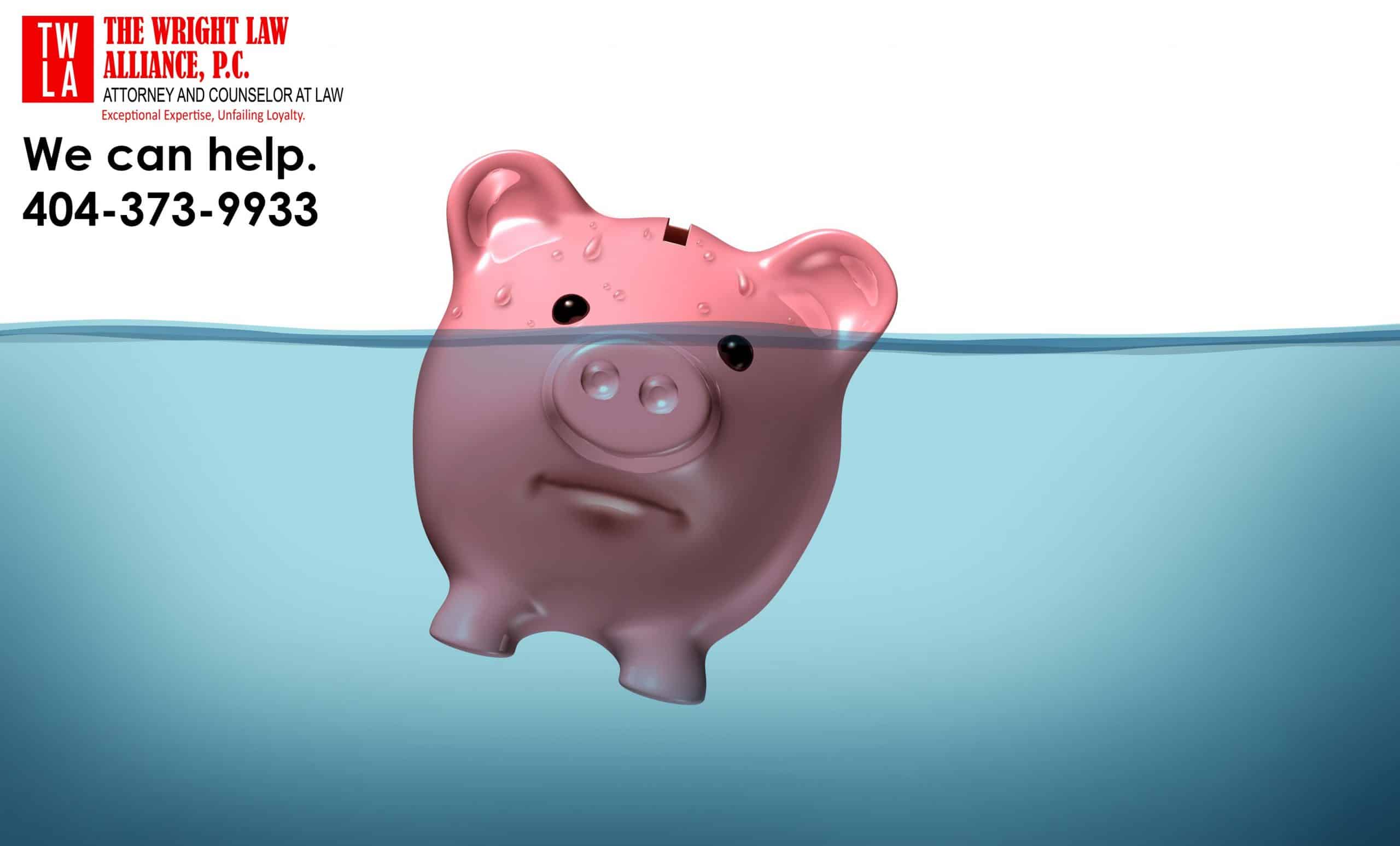With over 25 years of bankruptcy experience, and 10 years as a Bankruptcy Trustee for the Bankruptcy Court, The Wright Law Alliance, P.C. has the experience and expertise to help you and your family through any of these personal bankruptcy processes for the Bankruptcy Court. Call us to learn if bankruptcy is the right tool to get you back on track financially.
Chapter 7 Bankruptcy
Also known as “straight bankruptcy” or “liquidation”, Chapter 7 bankruptcy is the most common form of bankruptcy. Filing a Chapter 7 bankruptcy immediately stops creditor calls and collection attempts. It can also put a hold on foreclosure and repossession, giving you time to make other arrangements for yourself and your family. You can wipe out most, if not all, of your debts through the Chapter 7 discharge. Most Chapter 7 cases are finished in just a few months, allowing you to start rebuilding your credit as quickly as possible. We’d like to learn more about your situation which is why you can schedule a complimentary consultation with us. (Click here to begin)
Chapter 13 Bankruptcy
Chapter 13 bankruptcy is a great option if you are behind on your house or car payments and want time to “catch up,” so you can keep the property. Chapter 13 may also be the best option if you do not qualify for a Chapter 7 case, or if you have a large amount of unprotected equity in your home that you may lose in a Chapter 7 case. Chapter 13 involves repayment of debt (some or all) through a court-approved payment plan for 3 to 5 years. A Chapter 13 repayment plan can lower your monthly debt payments and give you some much-needed breathing room. Chapter 13 allows you to discharge (wipe out) debt, while you keep the property you want to keep. I’m the right bankruptcy lawyer who can help, call me.
Chapter 11
Individuals may file a Chapter 11 case when they want the benefits of a Chapter 13 repayment plan, but their debt is too high for a Chapter 13 case. There are also other benefits to individuals filing a Chapter 11 case over a Chapter 13 case:
- Prepetition mortgage arrears too high to pay in five years
- Pay the value of a car (if less than the amount you owe) that was recently financed
- You recently received a Chapter 7 or Chapter 13 discharge
- More time to pay non-dischargeable debts, like payroll taxes
Let The Wright Law Alliance, P.C. help you get back on the road to financial success. To find out about your options, click “chat live” or contact us today or tell us about your situation below.
We a debt relief agency. We help people file for Bankruptcy relief under the Bankruptcy Code.
If I Am Drowning In Debt Because Of Covid-19, What Are My Options?
If you have been financially affected by the COVID-19 pandemic, this article provides a couple of solutions to help you get out of debt. The safety measures taken against the spread of COVID-19 were as crippling to Georgians as the virus itself. Below are options you can consider in turning over a new leaf and starting over in these unprecedented times. The stay-at-home order and job layoffs forced many people into the unemployment lines. In trying to deal with the economic downturn, many people have turned towards debt. Some have resorted to borrowing from friends and family while others have resorted to bank loans and credit cards. Georgia is likely affected by the increased dependence on debt. The 16.9% poverty rate in the state is likely to surge because of COVID19. If you are affected by COVID-19 here are some options available to you to get back on your feet and to turn over a new leaf. Option A If you have found yourself with mounting debt because of COVID-19, you aren’t alone. Many Americans have debt. While some debt is a result of overspending, other debts happen due to uncontrollable circumstances. Before you jump at filing bankruptcy. let's look at some of the options below to get a handle on your debt: Cut down on your expenses When it comes to getting your finances in order, figure out where your money is going. If we look hard enough, we can find money to pay off debt by determining areas [...]
Chapter 7 vs. Chapter 13: Key Differences in These Bankruptcy Chapters
If the debt keeps mounting and you have found yourself drowning in bills and calls from debt collector calls, it might be time to seriously consider the option of bankruptcy. Two common programs used to eliminate debt are Chapter 7 and Chapter 13. Introduction to Bankruptcy There are various reasons why you would qualify for and choose one chapter over another, but one of the key factors considered is income. Chapter 7 Chapter 7, sometimes called liquidation bankruptcy, entails selling off most of your property to pay off debt. This form of bankruptcy is generally reserved for individuals with limited income who can't pay back their debt. Chapter 13 Chapter 13, also known as reorganization bankruptcy or the working man’s bankruptcy, is the more common option for individuals who have income sufficient enough to qualify for and finish a repayment plan mandated by the court. As a result of this, you might get to keep some of your property, too. The repayment plan allows you to pay back a portion of the debt you owe over a designated time period. After that, any remaining unsecured debts might be “discharged.” A few examples of unsecured debts include medical bills and credit cards. And in this case, discharged means you aren't required to pay them back. Will Filing Eliminate Credit Card Debt? There are certain debts that bankruptcy won't erase – such as mortgages, student loans and car loans. These are all secured debts. However, with Chapter 13, you might be able to [...]
Bankruptcy Chapter 7: What Is It?
If you’re considering bankruptcy, it is important to understand the different types and how they will impact you. Here, we’re going to take a look at Chapter 7 – also referred to as liquidation or straight bankruptcy. And this is probably the chapter people are most commonly familiar with. Chapter 7 bankruptcy is typically the best option for individuals who are far behind on debt payments and do not have the means to afford their monthly payments and living expenses. However, filing Chapter 7 bankruptcy does mean you might have to give up some of your belongings and your credit will be impacted. But as a last resort, this could be the way to hit the restart button on your finances. Do I Qualify for Chapter 7? There are a few requirements to determine your eligibility before you can actually file Chapter 7 bankruptcy. Your bankruptcy lawyer will review these with you: Complete a credit counseling course. Pass the means test. You can’t have filed for Chapter 7 in the last eight years or Chapter 13 in the last six years. If you did file and your case was dismissed, there is at least a 181-day waiting period before trying again. Keep in mind, even though you might be eligible to file, a court could still dismiss your case if it is found that you are attempting to defraud creditors. What Debts Can Be Discharged? Generally, unsecured debts – such as credit cards and medical bills – are discharged under Chapter [...]
Financial Stress? There’s A Solution for That.
People can face financial distress at any point in their life. And sometimes it can seem as if it just shows up out of nowhere to completely wreak havoc on your life as you know it. Especially in the face of the COVID-19 pandemic, more people are finding themselves strapped for money. It could be that you fell behind after losing your job. Or that unexpected medical bills arose and you didn’t have a backup plan. Whatever the circumstance is, recognizing financial distress is one of the first steps in addressing it: How to Recognize Financial Distress Having to live in a paycheck-to-paycheck type manner for a few weeks might not necessarily indicate a larger problem. So, how do you know when you are just having a hard two weeks versus when there is really a problem? You are using credit cards to pay bills. Credit cards can be dangerous. And if you are having to rely on your credit card to pay things such as utilities or rent, you know that something is wrong. While it might keep you going for a little bit, it is ultimately snowballing into a larger problem for later. You can only make the minimum monthly payments. When you factor in interest rates, paying merely the minimum monthly payment on credit cards will have you paying far more interest over time. And depending on your balance, this could have you paying on this particular debt for years and years. Additionally, it is a surefire [...]



